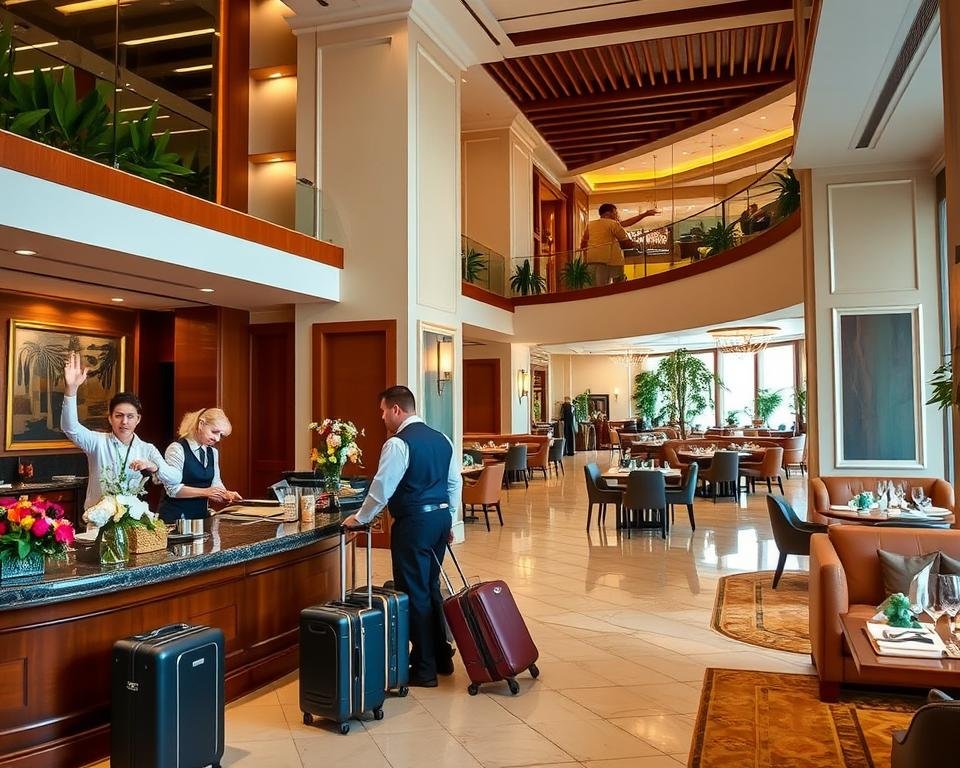The hospitality industry is huge and always changing. It includes many service-based areas. When applying for jobs, hospitality usually falls under the service industry or hospitality management.
This wide field includes jobs in hotels, restaurants, event planning, and tourism. Employers in this area look for people with great customer service skills, flexibility, and knowledge of the industry.
Hospitality management degrees range from associate to bachelor’s. They teach business practices, ethics, and special areas like lodging management. Even though some jobs don’t need a degree, higher roles do. So, then, what discipline would hospitality be under for job application?
Understanding the Foundations of Hospitality Discipline
The hospitality industry focuses on making customers happy and providing top-notch service. At its core are key values that guide those in hospitality management, customer service, and hotel management. These values include a focus on guests, professionalism, and cultural awareness.
Core Values in Hospitality Management
Hospitality pros know that success comes from giving guests amazing experiences. They must love tourism and understand what each guest wants. Being professional is also key, as workers need to act well, communicate clearly, and solve problems to keep things running smoothly.
Essential Skills for Success
The hospitality world needs special skills too. Good communication skills are vital for talking to guests and team members. Being able to adapt and solve problems quickly is also important. Plus, working well with others in different settings is a must for success.
Industry Standards and Expectations
The hospitality industry has high standards and expectations. Workers must keep learning and stay current with new trends and tech. They also need to follow rules and regulations to provide great service and help their businesses thrive.

“The key to success in the hospitality industry is to always put the guest first, while maintaining the highest standards of professionalism and cultural sensitivity.”
What Discipline Would Hospitality Be Under for Job Application
For job applications, hospitality usually falls under the service industry or hospitality management. It might also be listed under tourism, food and beverage, or hotel management, depending on the role.
To succeed in hospitality, show your experience in customer service and team management. Also, highlight your industry-specific skills. This makes your application more relevant and boosts your chances of getting hired.
- Hospitality graduates find jobs in hotels, restaurants, travel agencies, airlines, theme parks, and government departments.
- The Hospitality Discipline offers programs in Hotel and Catering, Tourism and MICE, and Leisure and Sports. These are supported by modern technology and a practical learning approach.
- Graduates from the Chinese Culinary Institute and International Culinary Institute are ready for careers in hotels, catering groups, restaurants, and the beverage industry.
- Higher Diploma students from the Hospitality Discipline can easily move to Degree programs offered by designated UK partner universities.
By matching your skills and experience with the hospitality discipline’s needs, you can stand out in the job market. This increases your chances of getting your dream job in the service industry or tourism sector.

“Programs in Chinese and international cuisine offered by the institutes have received accreditation and recognition from professional bodies such as the World Association of Chefs’ Societies, Wine and Spirit Education Trust, and United Nations World Tourism Organisation, among others.”
Key Areas of Hospitality Management and Operations
Hospitality management covers many areas, each needing its own set of skills. It includes food and beverage, hotel operations, and event planning. These fields offer many career paths for those interested in the hospitality industry.
Food and Beverage Management
Food and beverage management is about running restaurants, planning menus, and checking quality. People in this field need to know a lot about cooking, managing stock, and serving customers well. With a 7% job growth expected, there’s a lot of demand for skilled managers.
Hotel and Lodging Operations
Hotel and lodging operations are all about making guests happy. This includes taking care of rooms, facilities, and the whole property. The U.S. Bureau of Labor Statistics says lodging managers will see a 7% growth, showing their role is key.
Event Planning and Coordination
Event planning and coordination are about organizing big events like conferences and weddings. These professionals need to be good at managing projects, paying attention to details, and working with many people. With an 8% growth in jobs, event planners are in high demand.
The hospitality industry is always changing, making specialized knowledge and skills more important. By exploring these areas, you can find a rewarding career in this exciting field.

“The fastest growth rate among all major sectors is in the leisure and hospitality industry, as businesses focus on delivering exceptional customer experiences.”
Professional Conduct and Workplace Discipline
In the hospitality industry, being professional is key to great customer service and a good work place. The workplace discipline here is all about focusing on customers, working well together, and following rules. Employers in the hospitality industry make sure everyone knows what’s expected. They enforce rules fairly and treat employees right when it comes to discipline.
Good discipline strategies in hospitality aim to help, not just punish. They aim to build a positive work culture that shows the service-focused nature of the field. This way, employees can learn from mistakes and get better at their jobs, helping the whole team succeed.
Hospitality places have clear Conduct and Discipline Policies. These policies cover what’s okay to do, like following the Code of Conduct, stopping fraud, and reporting problems safely. They also have rules about being on time and showing up regularly, which is key for workplace discipline.
“Effective employee discipline is key for a positive work culture and success in the hospitality industry,” says a study by the American Hotel and Lodging Association.
The industry also values professional conduct outside work. It aims to build a culture of honesty, safety, teamwork, guest happiness, and being accountable. Employees who live these values do well and help the hospitality industry grow.

By using discipline strategies that focus on growth and respect, hospitality places can make a better work environment. This leads to more engaged employees, less conflict, and better guest experiences. It’s good for the company and helps employees grow, making the hospitality industry a great place to work.
Training and Development in Hospitality Careers
Investing in hospitality training and career development is key for success in this fast-paced industry. Certification programs from professional associations boost your skills and credibility. They give you an edge over others. Also, continuing education through conferences and online courses keeps you up-to-date with the latest trends and practices.
Certification Programs
Earning industry-recognized certifications shows your dedication to professional growth and mastering key hospitality skills. Some top certifications include:
- Certified Hospitality Supervisor (CHS) from the American Hotel & Lodging Educational Institute
- Certified Hotel Administrator (CHA) from the American Hotel & Lodging Association
- Certified Food and Beverage Executive (CFBE) from the National Restaurant Association
Continuing Education Opportunities
Keeping up with industry trends and best practices is vital for career advancement in hospitality. Options like online courses, conferences, and workshops help professionals grow. They cover a range of topics, from customer service to sustainability and new technologies.
Industry-Specific Qualifications
There are also specialized qualifications to boost your expertise and career chances. For instance, a sommelier certification for wine lovers or a hotel management diploma for future leaders. These provide deep knowledge and skills for specific roles in hospitality.
“Continuous learning and skill development are essential for success in the rapidly evolving hospitality industry.”
Employee Relations and Performance Management
Good employee relations and performance management are key in the hospitality world. They involve fair evaluations, regular feedback, and praising great service. Performance systems should focus on customer service, pushing employees to keep high standards.
Creating clear rules and procedures is critical in hospitality. Disciplinary steps can be verbal warnings, written ones, or even firing, based on the offense. Issues like not doing job tasks, bad behavior, or policy breaks might lead to action.
Managers need to watch for and fix performance or behavior problems. This includes noticing bad attitude, being late, or poor work quality. A step-by-step approach to discipline helps employees get better and meet the industry’s expectations.